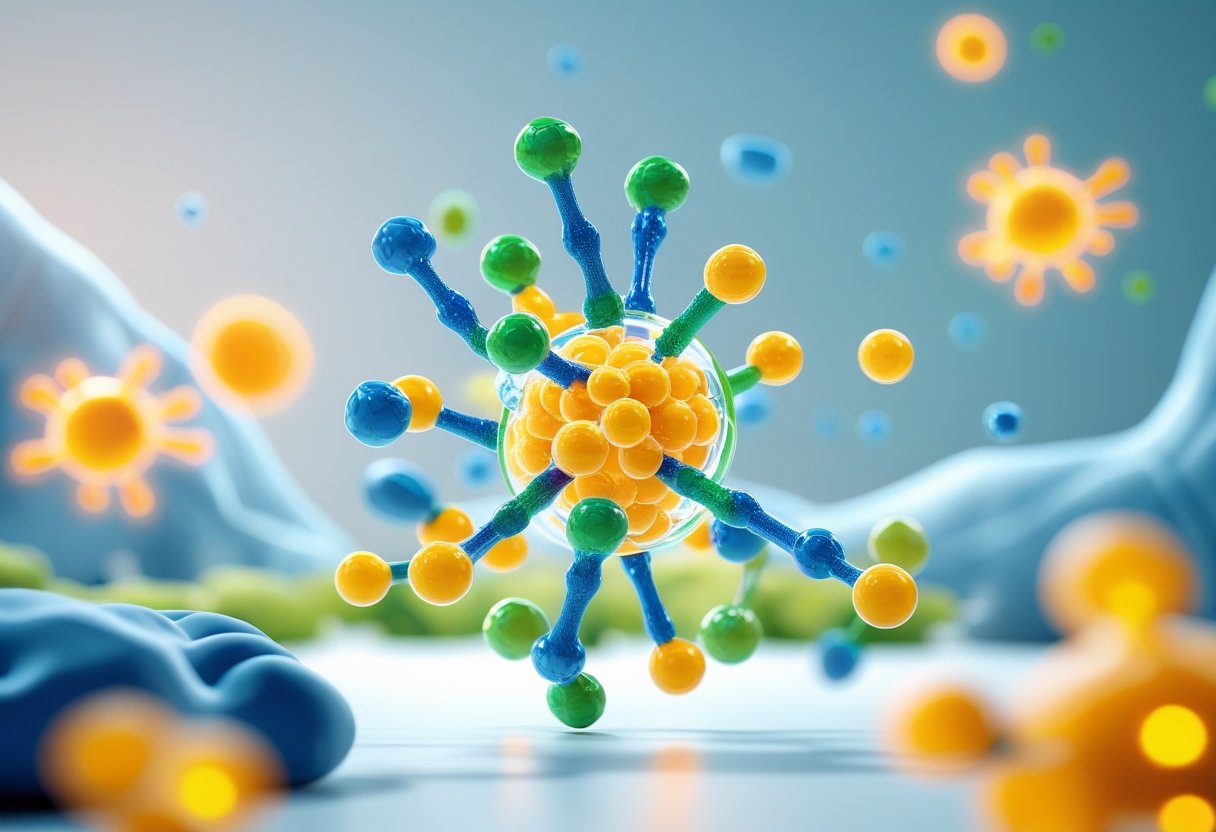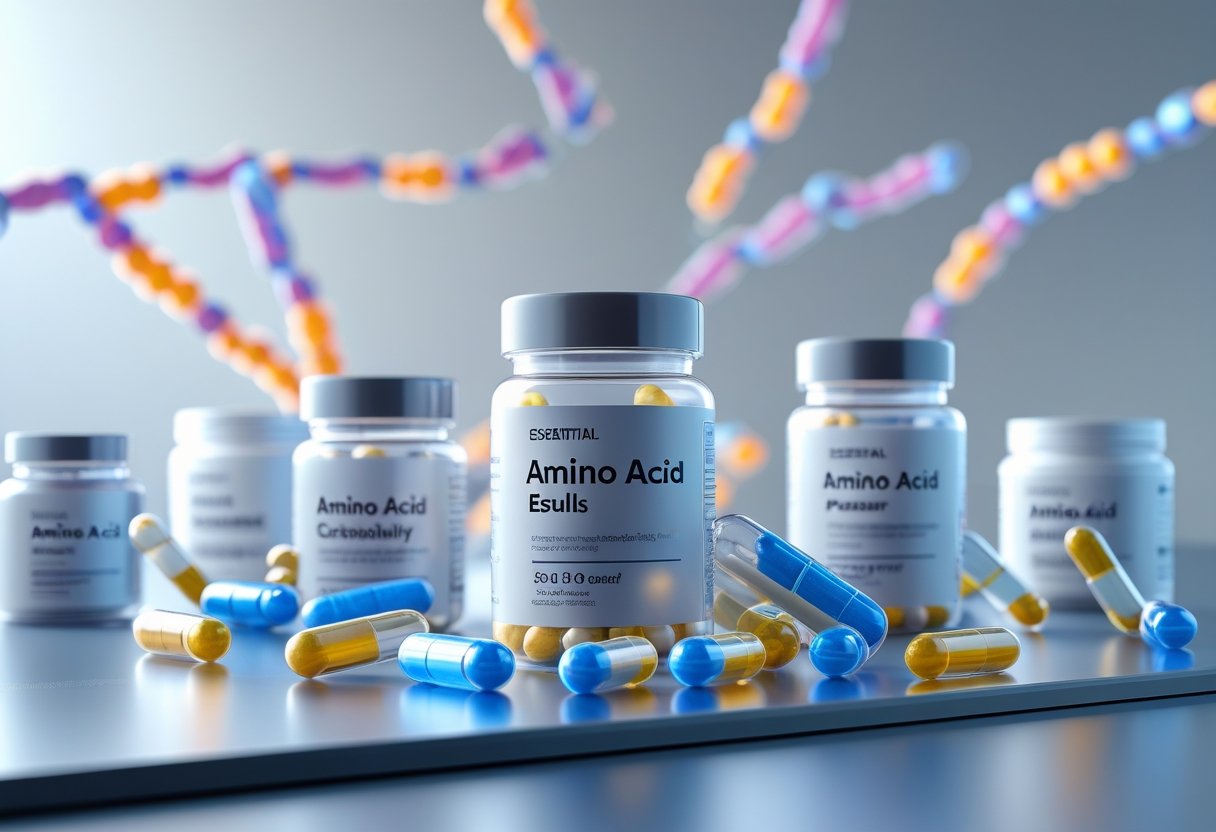Everyone needs essential amino acids to stay healthy, but many people may not know why they are important. These amino acids are called “es” initial” b” because the body cannot make them independently—they must come from food. Essential amino acids help build muscles, repair body tissues, and support overall health.

Getting enough essential amino acids has many benefits for the body and mind. As the Cleveland Clinic explains, these nutrients help repair muscles after exercise, support the immune system, and ensure vital hormones and brain chemicals are made correctly. Foods like meat, eggs, and beans provide these amino acids, but some also choose supplements for extra support.
Learning more about essential amino acids can help anyone make better choices for their health and well-being. Read on to find out how they work, where to get them, and what to consider if considering adding supplements.
Key Takeaways
- Essential amino acids are needed for many important body functions.
- They play a key role in muscle health, energy, and recovery.
- These nutrients come from certain foods and sometimes supplements.
What Are Essential Amino Acids?
Essential amino acids are building blocks of protein that the body cannot make alone. They must be obtained from food and play key roles in muscle and tissue repair, as well as many other body functions.
Definition and Classification
Amino acids are compounds that come together to form proteins. Nine of the 20 amino acids the body uses to build proteins are called essential amino acids. These are essential because the human body cannot make them by itself. It has to be supplied with foods like meat, eggs, dairy, beans, and some grains.
The nine essential amino acids include histidine, isoleucine, leucine, lysine, methionine, phenylalanine, threonine, tryptophan, and valine. They are needed for processes like hormone production, enzyme function, and tissue health. Food sources containing all nine are called complete proteins. Examples of these foods are eggs, fish, chicken, and soy.
Differences Between Essential and Non-Essential Amino Acids
Amino acids are grouped into essential and non-essential types. Essential amino acids must come from food because the body cannot produce them. Non-essential amino acids, like alanine and glutamine, can be made by the body using other compounds.
The main difference is their origin and how the body gets them. Growth, immune function, and recovery can suffer without enough essential amino acids. Many plant foods may be low in one or more essential amino acids, making it necessary to eat a varied diet.
The table below lists the main differences:
| Type | Does it have to come from the Diet? | Does it have to come from the? | Does it have to come from the the ? |
|---|---|---|---|
| Essential | No | Yes | Lysine, Leucine |
| Non-Essential | Yes | No | Glutamine, Alanine |
Branched-Chain Amino Acids (BCAAs)
Branched-chain amino acids (BCAAs) are a special group of three essential amino acids: leucine, isoleucine, and valine. They are named for their unique branched chemical structure. BCAAs comprise a large part of the total amino acid content in muscle.
BCAAs are essential for energy production and muscle repair. People who exercise often use BCAA supplements to help reduce fatigue and improve recovery. These amino acids can be found in meat, dairy, and eggs.
Research shows that BCAAs may help prevent muscle breakdown during exercise. They are key for anyone wanting to build or maintain muscle mass, as they directly support muscle tissue health and function. Learn more about BCAAs and their role in athletic performance at Healthline's sideBCAAs.
Key Benefits of Essential Amino Acids
Essential amino acids play many key roles in the body. They support protein building and muscle growth and help with energy during exercise.
Protein Synthesis and Muscle Growth
Essential amino acids are the main ingredients the body uses to make proteins. The body cannot produce them and must get them from food, which makes them crucial to muscle building and repair.
Leucine, isoleucine, and valine are three essential branched-chain amino acids found in foods like eggs, meat, and dairy. They help the body build new muscle tissue, keep muscles strong, and prevent muscle breakdown.
Table: Key Amino Acids for Muscle Growth
| Amino Acid | Key Function |
|---|---|
| Leucine | Triggers new muscle protein growth |
| Isoleucine | Fuels muscles during activity |
| Valine | Repairs and grows muscle tissue |
Without these amino acids, the body cannot repair muscles after exercise or grow stronger muscle fibers. This is why diets with complete proteins are vital for muscle health. Read more about how amino acids form essential proteins in the body.
Athletic Performance and Endurance
During exercise, the body uses amino acids for fuel and to help make energy. This is especially true for endurance activities like running or cycling. Essential amino acids can help athletes improve their stamina and keep their muscles working correctly.
Branched-chain amino acids are essential during long workouts. They support energy supply and help maintain focus. They also help lower tiredness during demanding exercise, so people can keep moving longer.
Athletes who consume a balanced diet with enough essential amino acids may notice that completing workouts and recovering between them is easier. For more on how amino acids support these functions, check out this short guide on the functions of amino acids in the body.
Recovery and Muscle Soreness
After exercise, muscles need to repair small tears and strains. Essential amino acids play a significant role in the healing process. They help rebuild muscle fibers and reduce the time it takes for soreness to go away.
Using amino acids right after workouts may help muscles heal faster. Leucine is especially notable since it starts the muscle repair process. People who get enough essential amino acids tend to recover more quickly and feel less muscle pain, allowing them to stick to their fitness plans.
Meeting daily amino acid needs keeps the body ready for the next workout. Research shows that regular intake helps reverse muscle loss and promote growth.
General Well-Being
Essential amino acids are not just for muscles. They are necessary for skin, hair, and organ health. They also support hormone production and the immune system.
Some amino acids help regulate blood sugar and ensure the brain has enough chemicals to function well. For example, phenylalanine and tryptophan are building blocks for key brain messengers. When people get enough essential amino acids, they may notice better mood, better sleep, and firmer skin and hair.
Eating a variety of protein-rich foods, such as eggs, lean meats, and beans, can help the body function at its best. For a list of foods high in these nutrients, see this guide to essential amino acids and food sources.
How Essential Amino Acids Support Muscle Health
Essential amino acids are building blocks that the body cannot produce independently. They play several key roles, including supporting muscle growth, aiding muscle repair, and helping to reduce exercise-induced fatigue.
Role of Leucine in Muscle Maintenance
Leucine is one of the most important essential amino acids for muscle health. It directly stimulates muscle protein synthesis, the process by which the body builds new muscle proteins after exercise. This makes leucine vital for muscle repair and growth in athletes and people recovering from illness or injury.
Many studies show that adding leucine to the Diet can help muscle breakdown, especially during weight loss or inactivity. Foods high in leucine include chicken, beef, eggs, soy, and dairy. People sometimes take leucine supplements to boost these benefits, but most can get enough from a balanced diet. For more information on leucine and its impact, see this article on essential amino acids and muscle health.
BCAAs for Reducing Fatigue
Branched-chain amino acids (BCAAs) include leucine, isoleucine, and valine. Because of their chemical structure, they are called “br” nched-chain” b” cauA”. BCAAs help muscles produce energy during exercise, delaying the onset of muscle fatigue.
Some research supports that BCAA supplements can help reduce muscle soreness after workouts and support recovery by decreasing muscle breakdown. People may feel less tired during intense exercise if they consume enough BCAAs. BCAAs are found in high-protein foods like meat, dairy, and eggs. Learn more about how BCAAs can reduce exercise fatigue and promote muscle health.
Dietary Sources of Essential Amino Acids

Essential amino acids come from a mix of animal-based and plant-based foods. Each type of food offers a different set of benefits in terms of nutrition and protein quality. Choosing the right foods helps people meet their needs and regulate their Diet.
Animal-BDiet Sources
Animal foods are some of the best sources of all essential amino acids. These proteins are called complete prote” b” cause they provide all nine critical types that the body cannot produce.
Examples include:
- Lean meats such as beef and poultry
- Fish like salmon or tuna
- Eggs
- Dairy products, including milk, cheese, and yogurt
Eating various animal-based foods can help meet essential amino acid needs. Even two servings can provide the body's requirements. Foods like eggs and dairy are also high in vitamins and minerals, making them nutritious choices. Learn more about which foods are considered complete proteins.
Plant-Based and Vegan Sources
Plant foods can also be good sources of essential amino acids, even though most do not provide all nine types in one food. Foods like beans, lentils, nuts, and seeds have some essential amino acids. However, most plant sources are called incomplete proteins, which means they do not have every essential amino acid.
Some plant foods are special because they are “co” plete proteins.” K” y examples include soy products (like tofu and tempeh), quinoa, and buckwheat. Vegans and vegetarians can get what they need by mixing different protein-rich foods during the day, such as rice with beans or hummus with whole-grain bread.
By combining foods, those who follow a plant-based diet can get enough essential amino acids to stay healthy. Verywell Health has more details about plant-based options and their amino acid content.
Importance of a Balanced Diet
Getting enough essential amino acids is linked to eating a balanced diet with various protein sources. Relying on one single type of protein can lead to missing out on specific nutrients over time.
For people who eat animal products, combining them with grains, fruits, and vegetables brings extra benefits like fiber and antioxidants. For vegans, mixing different plant foods across meals helps to cover all amino acid needs.
A balanced diet supports healthy growth, muscle repair, and immune system function. Eating a wide range of animal- or plant-based protein sources is the key to ensuring the body gets every essential amino acid it needs. Table 1 shows familiar sources and their amino acid profile:
| Food | Complete Protein? | Diet Type |
|---|---|---|
| Chicken breast | Yes | Omnivore |
| Eggs | Yes | Omnivore/Vegetarian |
| Tofu (soy) | Yes | Vegan/Vegetarian |
| Quinoa | Yes | Vegan/Vegetarian |
| Lentils | No | Vegan/Vegetarian |
| Nuts | No | Vegan/Vegetarian |
Essential Amino Acid Supplements

Supplements with essential amino acids are used for different purposes, such as muscle recovery, tissue repair, and filling gaps in diets that lack certain proteins. Some supplements are made with all essential amino acids, while others focus on specific groups based on health goals or dietary needs.
Types of Amino Acid Supplements
There are three main types: single amino acid supplements, branched-chain amino acid (BCAA) supplements, and complete essential amino acid supplements. Single amino acid products give just one, like lysine or tryptophan. BCAAs, which include leucine, isoleucine, and valine, are popular for exercise and muscle support.
Complete supplements contain all nine essential amino acids, which the body cannot make alone. These are often recommended for muscle building, recovery, and overall health. Some formulas come in powder form, while others are available as capsules or tablets.
When choosing between types, the decision often depends on the specific benefit that someone is looking for. For instance, athletes might choose BCAAs, but those looking for balanced nutrition will likely benefit more from complete essential amino acid blends. This Cleveland Clinic article about amino acid supplements provides more information about formulas and effectiveness.
Choosing an Effective Supplement
A high-quality essential amino acid supplement should provide all nine essential amino acids. Labels should list precise dosages for each component so users can understand exactly what they are taking. It is also necessary to check for third-party testing to make sure products are free from contaminants and accurately labeled.
Products made without unnecessary fillers, sugar, or synthetic additives may be safer and better tolerated. Reading customer reviews and checking for reputable brands can help ensure the supplement is trustworthy. For those with allergies or sensitivities, ensure supplements are labeled allergen-free.
Some people take supplements for recovery, while others use them to counter muscle loss, especially after surgery or with age. Clinical research suggests supplementation can support muscle growth and maintenance, especially for people without enough food.
Supplementation for Vegan and Vegetarian Diets
Vegans and vegetarians may have a harder time getting all essential amino acids because plant foods often lack one or more of them. While foods like beans, lentils, and quinoa contain some, they may not be complete sources.
Many supplements are made from animal products, so vegans and vegetarians need to look for plant-based or synthetic versions. These usually use fermented beans or grains as the source. Vegans often take supplements to fill nutritional gaps since they do not eat animal proteins.
Anyone on a plant-based diet should check labels carefully for animal ingredients, like gelatin capsules. Choosing a vegan-certified essential amino acid supplement can help maintain proper protein balance and support overall health. Plant-based options are becoming more widely available and practical, making meeting daily needs easier and preventing deficiencies.
Considerations and Safety Tips
Essential amino acids are key in muscle growth, repair, and bodily functions. While most people can get what they need from food, supplements are common and have specific guidelines and risks.
Recommended Dosages
Most people get enough essential amino acids through a balanced diet of meat, eggs, and beans. For those who take amino acid supplements, the dosage depends on factors like age, body weight, activity level, and health goals.
The typical daily intake for adults ranges from 10 to 20 grams of essential amino acids, often taken in divided doses. It is important to exceed the suggested amount on the supplement labels, as too little can stress the kidneys and liver.
Athletes or those recovering from illness may need slightly higher amounts, but it's best to ask a doctor or nutritionist before making any changes. Some supplements are sold as individual amino acids, while others are blends, so users should read labels carefully to avoid excess intake.
Potential Side Effects
While amino acid supplements are usually considered safe, there can be side effects. Overuse can cause digestive issues like bloating, stomach pain, or diarrhea.
Some people may feel tired, have headaches, or experience mood swings if they use amino acid supplements without following guidelines. People with kidney or liver conditions face higher risks from too much protein or amino acid intake because their bodies may struggle to process it.
If someone notices any unwanted symptoms after starting a supplement, it is best to stop use and consult a doctor. Reading labels and following serving size instructions reduces the risk of side effects.
Who Can Benefit Most?
Essential amino acid supplements may help athletes looking to boost muscle growth, people recovering from injuries, or older adults who struggle with muscle loss. Under medical supervision, those with certain health issues, like malnutrition or muscle-wasting diseases, may also benefit.
Vegetarians and vegans who do not eat many complete protein sources could find supplements helpful in meeting daily needs. Supplements are not usually required for most healthy people eating a balanced diet since common foods supply all essential amino acids.
Supplements may make sense in limited cases, but everyone should consider their health status and Diet before taking them. A doctor or dietitian can help determine if supplements are necessary.
Conclusion
Essential amino acids help the body build and repair muscle. They also support the immune system and assist with digestion. However, the body cannot make these nutrients on its own.
Getting enough essential amino acids is possible through meat, fish, eggs, beans, and nuts. Each type of food provides different amounts and combinations.
Some key benefits include:
- Building and repairing muscles
- Supporting hormone and enzyme production
- Helping the immune system function properly
- Assisting with nutrient absorption
Doctors and dietitians often recommend a balanced intake of protein-rich foods for these reasons. For many people, eating a varied diet is the best way to meet their daily amino acid needs.
Amino acids also help the body make essential compounds, like peptide hormones and creatine. They are needed for many processes throughout life.
Kids, teens, and adults need amino acids, but the amount can depend on age, activity, and health. Supplements may be helpful under medical advice in special cases.
The Cleveland Clinic and Medical News Today provide more detailed information about the benefits of amino acids.
Frequently Asked Questions
Essential amino acids are needed for building muscle, repairing tissues, and supporting many body functions. People get them from food, and not getting enough can affect health.
What functions do essential amino acids serve in the body?
Essential amino acids make protein, which builds and repairs muscles and organs. They help the body absorb nutrients and play a part in chemical reactions. Some amino acids also help prevent muscle loss and support the immune system. More details about essential amino acids can be found on Healthline's website.
Which foods are rich in essential amino acids?
Animal-based foods like meat, eggs, fish, and dairy are complete sources of essential amino acids. Certain plant-based foods, such as soy, quinoa, and buckwheat, also have all the essential amino acids. Other plant foods, like beans and whole grains, may need to be combined to complete the set. Find more examples from Medical News Today.
How many essential amino acids are indispensable for human health?
Nine essential amino acids must be obtained through Diet. The body does not produce these nine amino acids on its own, so it is necessary to eat the right foods.
Are there any side effects associated with amino acid supplementation?
Taking amino acid supplements can sometimes lead to minor side effects, such as digestive upset or mood changes. Large doses over time may strain the kidneys or cause imbalances if not monitored. Athletes and certain patients may benefit, but it's best to talk with a healthcare provider first. Learn more from MedicineNet.
What are the signs of an amino acid deficiency in the body?
Signs of deficiency can include muscle loss, tiredness, slow healing, and a weakened immune system. If essential amino acids are lacking, children may have growth problems.
What is the recommended daily intake of amino acids for muscle growth?
The ideal intake depends on age, sex, and activity level. People who exercise or want to build muscle usually need more protein, which provides these amino acids. According to EatingWell, most experts recommend 1.2 to 2 grams of protein per kilogram of body weight daily for muscle growth.

